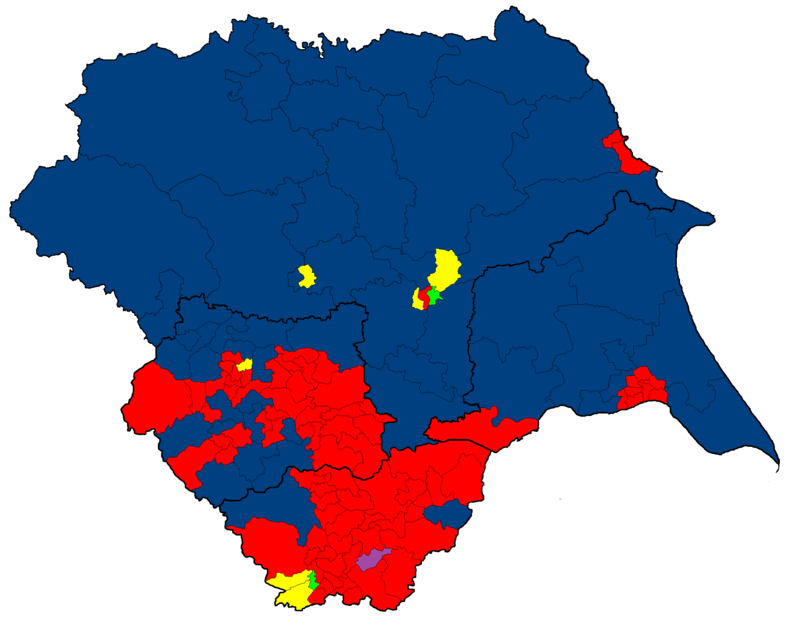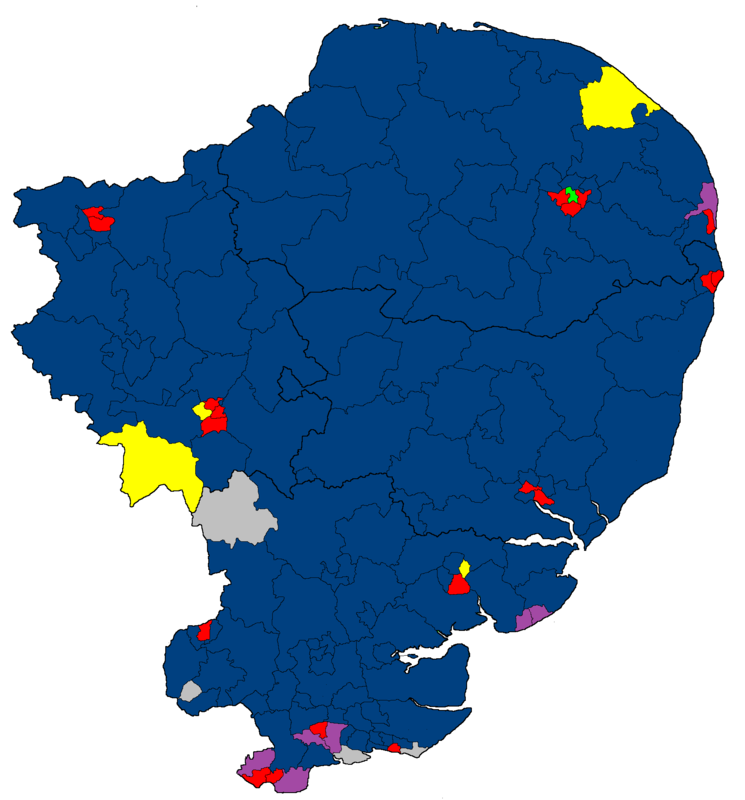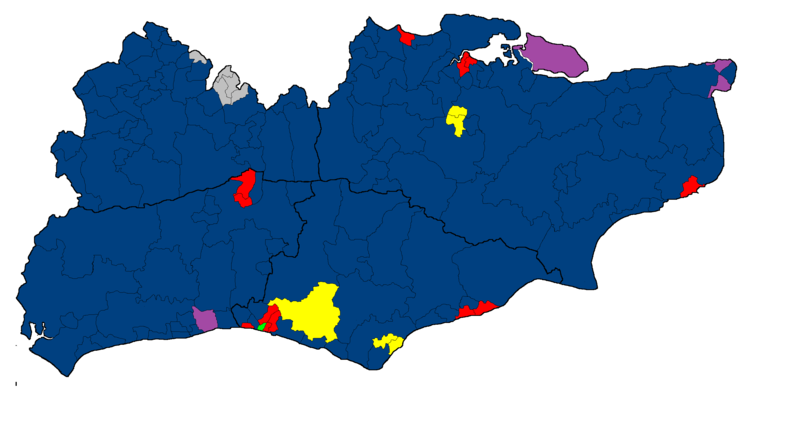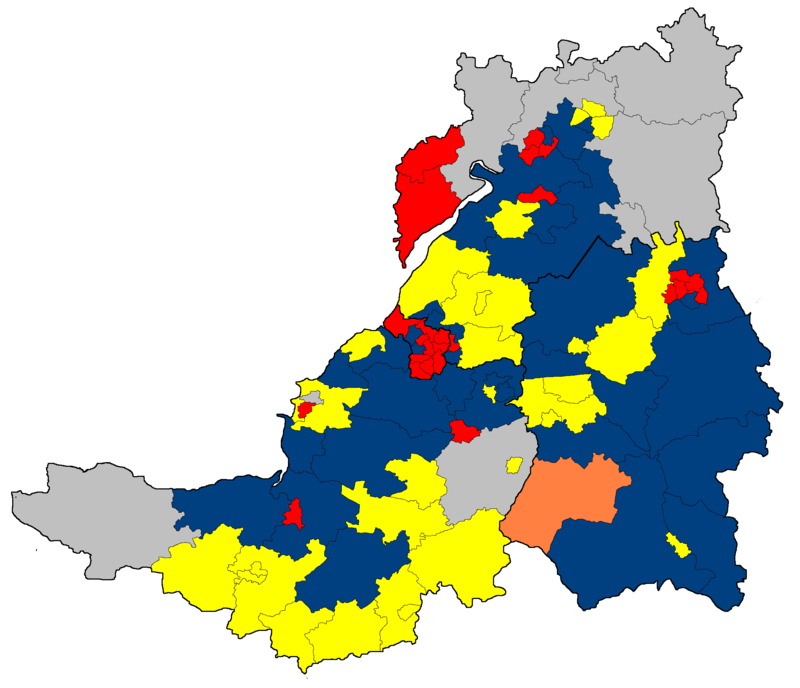|
|
Post by afleitch on Jan 19, 2016 17:24:15 GMT
As much as I like this experiment it demonstrates how truly awful federal states in England would be without some form of PR. Well, up to a point ... If there really were Landtags, then the administrations would become reasonably well known and reported on. An administration that became complacent or corrupt would open the door to being challenged - possibly not by a party which did badly in national politics, but by a local party. We do have some evidence from local authorities that local scandals and incompetence do shift votes. Cheshire West and Chester went Labour this year, for instance. Stoke-on-Trent was lost by Labour. An FPTP system on steroids would still leave a lopsided result because the same issues of vote spread etc get multiplied at a more local level. Indeed it can get worse. If you do as the Scotland Act 1978 suggested and split each of Scotlands seats into two, Labour's 1 seat majority on constituencies in 2007 becomes even larger (11) with a simple doubling of seats due to it's then more uniform vote share on a rough calculation. Despite 68% not voting for them. FPTP tends to be more disproportionate the smaller the unit it is applied to. |
|
|
|
Post by greenchristian on Jan 21, 2016 18:52:03 GMT
As much as I like this experiment it demonstrates how truly awful federal states in England would be without some form of PR. Whilst I agree with your general point, if these had been real elections the results would have looked slightly different. There are plenty of seats in the landtags where a party held one (or more) of the constituent wards in the relevant local election, but did not win the landtag seat because they didn't work the other ward(s) in the seat. And that's ignoring the effects of turnout for these elections, and the impact of administration parties/coalitions policies and (perceived) competence on the vote. |
|
|
|
Post by Pete Whitehead on Jul 24, 2016 10:08:06 GMT
Yorkshire 2015 | | | | Change | seats | change | | Lab | 813147 | 35.7% | -5.0 | 88 | -6 | | Con | 618396 | 27.1% | -1.1 | 53 | +6 | | UKIP | 345062 | 15.1% | +13.2 | 1 | +1 | | LD | 213147 | 9.4% | -5.0 | 6 | 0 | | Grn | 158602 | 7.0% | +1.9 | 2 | +2 | | Ind | 90719 | 4.0% | -2.7 | | -3 | | Oth | 40504 | 1.7% | -1.2 | | |
 Con Gain from Lab Harworth Keighley Ossett Pudsey (2) Con Gain from Ind Richmond Lab Gain from Ind Scarborough North Scarborough South Lab Gain from LD Sheffield Heeley Grn Gain from Lab Sheffield Broomhill York East UKIP Gain from Lab Wickersley LD Gain from Lab York West |
|
|
|
Post by Pete Whitehead on Jul 24, 2016 10:09:58 GMT
|
|
|
|
Post by Pete Whitehead on Aug 6, 2016 14:21:56 GMT
Essex-East Anglia 2015 | | | | Change | seats | change | | Con | 847565 | 42.2% | -1.7 | 115 | +3 | | Lab | 396214 | 19.7% | -2.9 | 19 | -6 | | UKIP | 294878 | 14.7% | +11.1 | 7 | +7 | | LD | 206560 | 10.3% | -5.9 | 4 | -4 | | Grn | 133997 | 6.7% | +1.6 | 1 | - | | Ind | 94911 | 4.7% | -2.3 | 4 | - | | Oth | 35318 | 1.8% | +0.2 | | |
 Con Gain from LD Brentwood Chelmsford North Colchester North Coltishall Ely Con Gain from Lab Harlow West Ipswich SW Kings Lynn Con Gain from Ind Southend Southchurch UKIP Gain from Lab Basildon East Basildon West Great Yarmouth North Ockendon Tilbury UKIP Gain from Con Clacton East Clacton West Lab Gain from Con Peterborough East Chafford LD Gain from Con Melbourne Ind Gain from Con Saffron Walden |
|
|
|
Post by Pete Whitehead on Aug 6, 2016 14:25:58 GMT
|
|
Adrian
Co-operative Party
Posts: 1,742 
|
Post by Adrian on Aug 6, 2016 21:15:13 GMT
I agree that regional parliaments will be pretty farcical without PR. They suffer from physical remoteness from the electorate as it is, and if a party has a locked-in majority, like the Tories in the Eastern region, they suffer from metephorical remoteness as well, since the regional government has no incentive to engage with voters. It'd be interesting to see what PR results for the Landtage would be.
|
|
|
|
Post by johnloony on Aug 6, 2016 23:14:22 GMT
I agree that regional parliaments will be pretty farcical without PR. They suffer from physical remoteness from the electorate as it is, and if a party has a locked-in majority, like the Tories in the Eastern region, they suffer from metephorical remoteness as well, since the regional government has no incentive to engage with voters. It'd be interesting to see what PR results for the Landtage would be. If there really were a Landtag like this, and even if it were elected by FPTP, then the Conservative Party would not have a permanent "locked in" majority. If the administration got too corrupt or arrogant or incompetent over a period of time, it would eventually be overthrown by tactical voting, and/or a combination of opposition parties uniting to defeat it, and/or the rise of a local party like the Bumpkins' Party or the Flat-Earth Party. There might be sudden big changes once every 30 or 40 years, a bit like in Alberta. |
|
|
|
Post by Pete Whitehead on Aug 6, 2016 23:39:51 GMT
The Conservatives had only 52 seats of 150 (compared to 50 for Labour) in 1973 while Labour would have won an outright majority in 1995
|
|
|
|
Post by Pete Whitehead on Aug 6, 2016 23:49:52 GMT
Some kind of PR scenario could easily be done for these regions but the problem with doing so is that not all parties contest all wards, so using actual votes cast in local elections would not reflect true levels of party support and therefore any PR result would not be meaningful. For example, if you look at the thematic maps above you see almost a complete absence of Lib Dem candidates in much of West Norfolk, whereas if seats were fought under PR one presumes the main candidates would put a list up in every seat. Or look at some rather surprising places where UKIP are absent such as the western part of Tendring district or the town of Witham. It means that the results for Braintree and Tendring districts (which might be the kind of electoral areas which would be used with 5 seats apiece) would be skewed, likewise the somewhat inexplicable absence of Labour candidates lately in Waltham Abbey.
IN other words it would only work if you had the five main parties consistently contesting every (or almost every) ward
|
|
|
|
Post by Pete Whitehead on Aug 6, 2016 23:58:56 GMT
It is of course a reason why PR is desirable from the Psephologists point of view because it means that hopefully all main parties are represented on the ballot paper in every area, as we have seen in Scotland, But of course this would only be genuinely useful if the votes continued to be counted in small areas (ideally polling districts). Then the thematic maps would display true levels of partisan support in a way those above do not (as with the examples mentioned above which show areas of UKIP weakness in parts of Tendring or in Witham when they are in reality nothing of the sort)
|
|
|
|
Post by Pete Whitehead on Aug 17, 2016 19:30:10 GMT
Sussex Kent 2015 | | | | Change | seats | change | | Con | 984855 | 42.5% | -4.4 | 123 | +4 | | Lab | 403299 | 17.4% | -1.6 | 12 | -1 | | UKIP | 333339 | 14.4% | +10.3 | 4 | +4 | | LD | 271487 | 11.7% | -5.9 | 5 | -5 | | Grn | 167184 | 7.2% | +3.0 | 1 | -2 | | Ind | 137764 | 5.9% | -1.4 | 5 | - | | Oth | 21392 | 0.9% | 0.1 | | |
 Con Gain from LD Canterbury Chichester Guildford West Horsham South Worthing West Con Gain from Lab Portslade UKIP Gain from Con Lancing Sheppey UKIP Gain from Lab Margate Ramsgate Lab Gain from Grn Brighton Hannover Brighton Preston Lab Gain from Con Hove West |
|
|
|
Post by AustralianSwingVoter on Aug 30, 2016 1:44:04 GMT
What about Wales, Scotland and Northern Ireland?
and also I can't wait for the rest of the regions;
East Mercia
Upper Wessex
Northumbria
Devon-Cornwall
West Mercia
|
|
|
|
Post by AustralianSwingVoter on Aug 30, 2016 1:55:58 GMT
Just to help Pete Whitehead: Finally can put this to bed and move on to the more recent (2015) results everywhere | | 1991 | | seats | | Con | 300378 | 33.1% | 34 | | LD | 263755 | 29.1% | 31 | | Lab | 225996 | 24.9% | 25 | | Ind | 82544 | 9.1% | 9 | | Grn | 26637 | 2.9% | | | Oth | 8149 | 0.9% | 1 |
Perhaps the most proportional result I've ever seen on FPTP The 'other' is a Liberal in Warminster who may or may not in fact have been a Liberal Democrat (in any case the Lib Dems did not contest any of the component wards)  |
|
|
|
Post by AustralianSwingVoter on Aug 30, 2016 1:58:36 GMT
...Essex-East Anglia 2015... All you need is East Anglia, the Essex is unnecessary |
|
J.G.Harston
Lib Dem
Leave-voting Brexit-supporting Liberal Democrat
Posts: 14,759 
|
Post by J.G.Harston on Aug 30, 2016 2:04:25 GMT
...Essex-East Anglia 2015... All you need is East Anglia, the Essex is unnecessary I like it, it makes it sound like North Rhine-Westphalia. |
|
|
|
Post by East Anglian Lefty on Aug 30, 2016 20:55:19 GMT
...Essex-East Anglia 2015... All you need is East Anglia, the Essex is unnecessary This is not actually correct. Parts of northern Essex are considered to be East Anglia by some locals (though we're probably a distinct minority), but most of the population of Essex lives in the south of county, and nobody in Chelmsford, let alone Basildon, thinks they live in East Anglia. |
|
|
|
Post by Arthur Figgis on Aug 30, 2016 21:40:29 GMT
All you need is East Anglia, the Essex is unnecessary This is not actually correct. Parts of northern Essex are considered to be East Anglia by some locals (though we're probably a distinct minority), but most of the population of Essex lives in the south of county, and nobody in Chelmsford, let alone Basildon, thinks they live in East Anglia. Well, the Costa-del-Estuary is basically Upminster-sur-Mer. (Although Shankill-sur-Mer for Millisle is my favourite of such isms) |
|
|
|
Post by East Anglian Lefty on Aug 30, 2016 22:39:40 GMT
Not just the estuary, either. In the immortal words of my grandmother (born in Poplar), "Londoners are ruining Clacton."
|
|